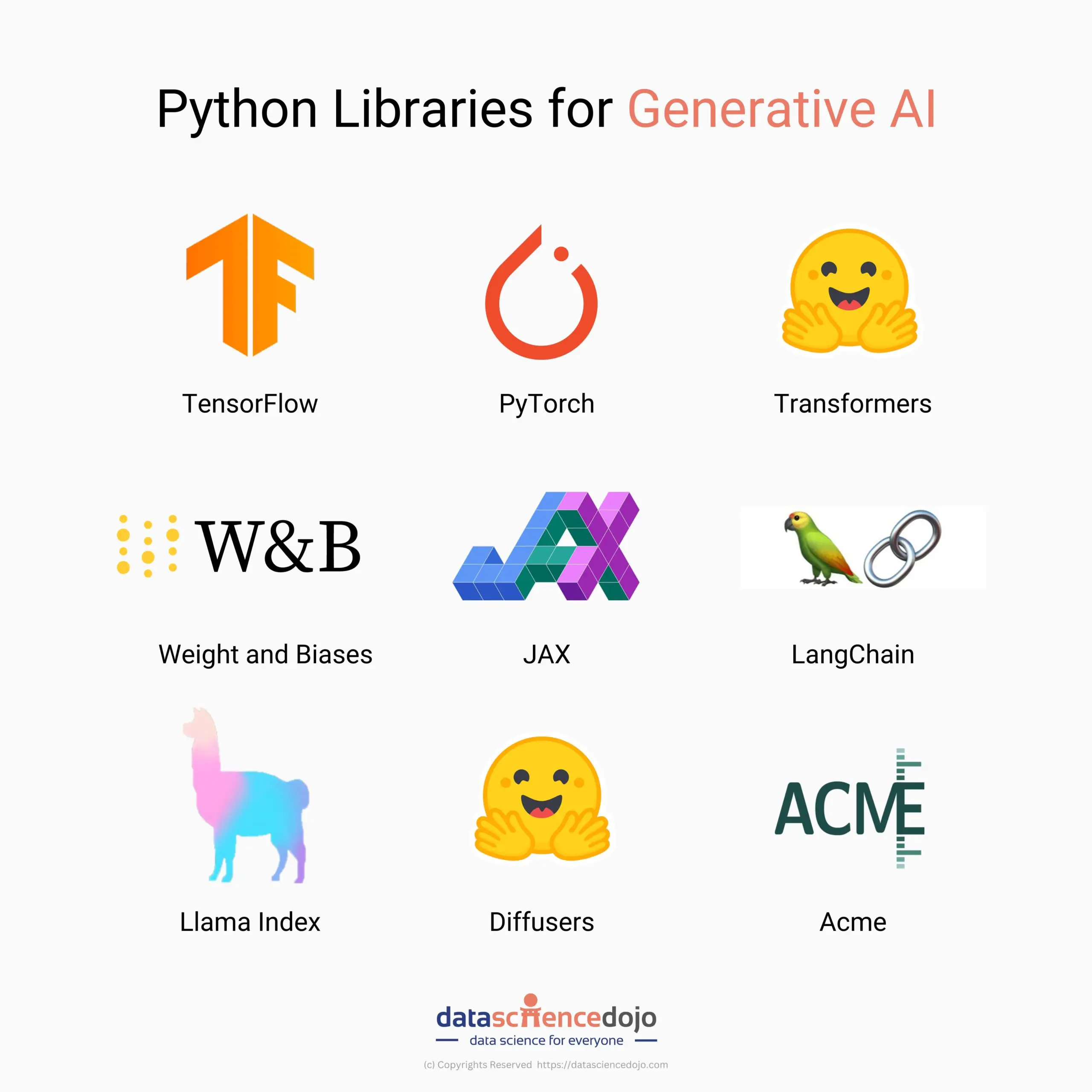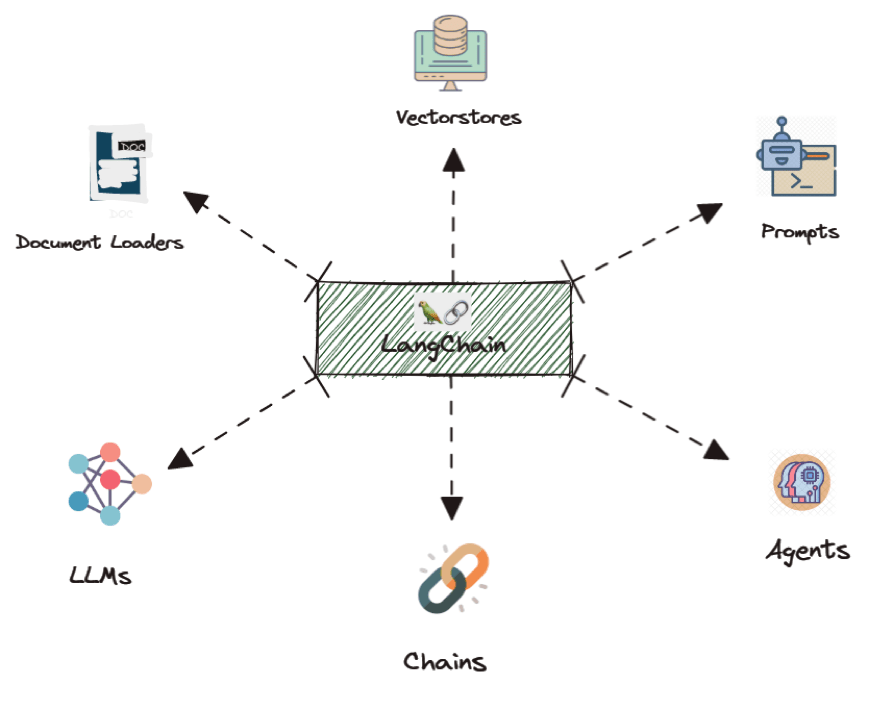Generative AI is a branch of artificial intelligence that focuses on the creation of new content, such as text, images, music, and code. This is done by training machine learning models on large datasets of existing content, which the model then uses to generate new and original content.
Want to build a custom large language model? Check out our in-person LLM bootcamp.
Popular Python libraries for Generative AI

Python is a popular programming language for generative AI, as it has a wide range of libraries and frameworks available. Here are 10 of the top Python libraries for generative AI:
1. TensorFlow:
TensorFlow is a popular open-source machine learning library that can be used for a variety of tasks, including generative AI. TensorFlow provides a wide range of tools and resources for building and training generative models, such as convolutional neural networks (CNNs) and recurrent neural networks (RNNs).
TensorFlow can be used to train and deploy a variety of generative models, including:
- Generative adversarial networks (GANs)
- Variational autoencoders (VAEs)
- Transformer-based text generation models
- Diffusion models
TensorFlow is a good choice for generative AI because it is flexible and powerful, and it has a large community of users and contributors.
2. PyTorch:
PyTorch is another popular open-source machine learning library that is well-suited for generative AI. PyTorch is known for its flexibility and ease of use, making it a good choice for beginners and experienced users alike.
PyTorch can be used to train and deploy a variety of generative models, including:
- Conditional GANs
- Autoregressive models
- Diffusion models
PyTorch is a good choice for generative AI because it is easy to use and has a large community of users and contributors.
3. Transformers:
Transformers is a Python library that provides a unified API for training and deploying transformer models. Transformers are a type of neural network architecture that is particularly well-suited for natural language processing tasks, such as text generation and translation.
Transformers can be used to train and deploy a variety of generative models, including:
- Transformer-based text generation models, such as GPT-3 and LaMDA
Transformers is a good choice for generative AI because it is easy to use and provides a unified API for training and deploying transformer models.
4. Diffusers:
Diffusers is a Python library for diffusion models, which are a type of generative model that can be used to generate images, audio, and other types of data. Diffusers provides a variety of pre-trained diffusion models and tools for training and fine-tuning your own models.
Diffusers can be used to train and deploy a variety of generative models, including:
- Diffusion models for image generation
- Diffusion models for audio generation
- Diffusion models for other types of data generation
Diffusers is a good choice for generative AI because it is easy to use and provides a variety of pre-trained diffusion models.
5. Jax:
Jax is a high-performance numerical computation library for Python with a focus on machine learning and deep learning research. It is developed by Google AI and has been used to achieve state-of-the-art results in a variety of machine learning tasks, including generative AI. Jax has a number of advantages for generative AI, including:
- Performance: Jax is highly optimized for performance, making it ideal for training large and complex generative models.
- Flexibility: Jax is a general-purpose numerical computing library, which gives it a great deal of flexibility for implementing different types of generative models.
- Ecosystem: Jax has a growing ecosystem of tools and libraries for machine learning and deep learning, which can be useful for developing and deploying generative AI applications.
Here are some examples of how Jax can be used for generative AI:
- Training generative adversarial networks (GANs)
- Training diffusion models
- Training transformer-based text generation models
- Training other types of generative models, such as variational autoencoders (VAEs) and reinforcement learning-based generative models
Get started with Python, checkout our instructor-led live Python for Data Science training.
6. LangChain:
LangChain is a Python library for chaining multiple generative models together. This can be useful for creating more complex and sophisticated generative applications, such as text-to-image generation or image-to-text generation.

LangChain is a good choice for generative AI because it makes it easy to chain multiple generative models together to create more complex and sophisticated applications.
7. LlamaIndex:
LlamaIndex is a Python library for ingesting and managing private data for machine learning models. LlamaIndex can be used to store and manage your training datasets and trained models in a secure and efficient way.
LlamaIndex is a good choice for generative AI because it makes it easy to store and manage your training datasets and trained models in a secure and efficient way.
8. Weight and biases:
Weight and Biases (W&B) is a platform that helps machine learning teams track, monitor, and analyze their experiments. W&B provides a variety of tools and resources for tracking and monitoring your generative AI experiments, such as:
- Experiment tracking: W&B makes it easy to track your experiments and see how your models are performing over time.
- Model monitoring: W&B monitors your models in production and alerts you to any problems.
- Experiment analysis: W&B provides a variety of tools for analyzing your experiments and identifying areas for improvement.
9. Acme:
Acme is a reinforcement learning library for TensorFlow. Acme can be used to train and deploy reinforcement learning-based generative models, such as GANs and policy gradients.
Acme provides a variety of tools and resources for training and deploying reinforcement learning-based generative models, such as:
- Reinforcement learning algorithms: Acme provides a variety of reinforcement learning algorithms, such as Q-learning, policy gradients, and actor-critic.
- Environments: Acme provides a variety of environments for training and deploying reinforcement learning-based generative models.
- Model deployment: Acme provides tools for deploying reinforcement learning-based generative models to production.
Python libraries help in building generative AI applications
These libraries can be used to build a wide variety of generative AI applications, such as:
- Chatbots: Chatbots can be used to provide customer support, answer questions, and engage in conversations with users.
- Content generation: Generative AI can be used to generate different types of content, such as blog posts, articles, and even books.
- Code generation: Generative AI can be used to generate code, such as Python, Java, and C++.
- Image generation: Generative AI can be used to generate images, such as realistic photos and creative artwork.
Generative AI is a rapidly evolving field, and new Python libraries are being developed all the time. The libraries listed above are just a few of the most popular and well-established options.




